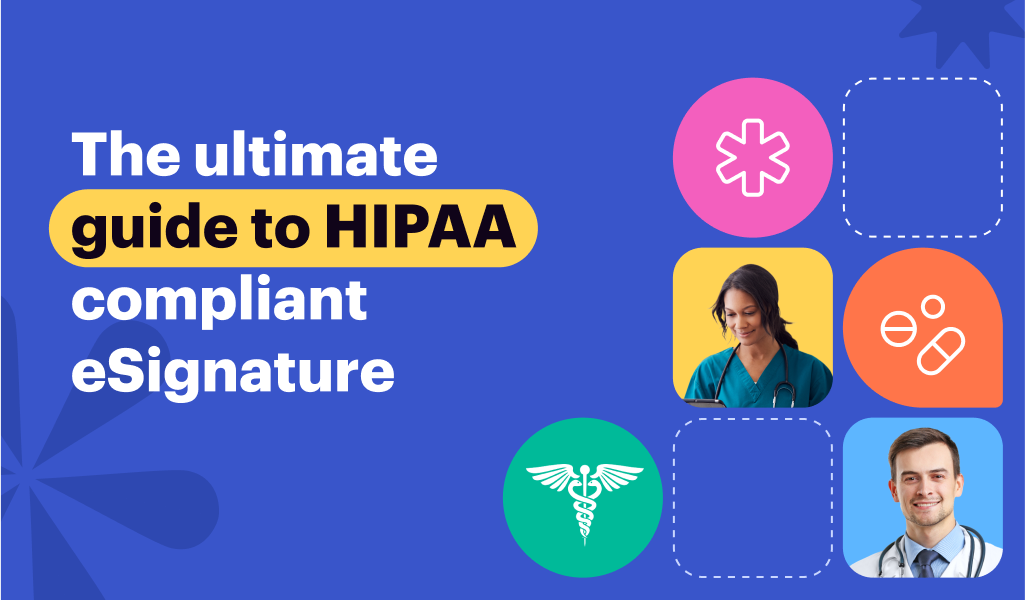signNow for Healthcare: The ultimate guide to HIPAA-compliant electronic signature

Prioritizing patient care over paperwork with HIPAA electronic signature
The healthcare industry is still reeling from the challenges brought on by the pandemic. Now more than ever, it is important to find smarter and faster ways to complete time-consuming processes in order to give staff back time to care for patients. So, what does going digital with HIPAA-compliant tools look like?
In this blog, we’ll walk you through the concept and use cases of a HIPAA-compliant eSignature. Also, you will learn how signNow enables HIPAA compliant document signing for healthcare organizations.
Let’s get started!
How to streamline healthcare workflows and signature cycles in 2022

We know healthcare is filled with many necessary but manual and repetitive processes. Healthcare professionals have to balance patient forms, physician credentialing, and meeting compliance regulations — all while providing patient care. Patients, on the other hand, have to fill out pages of paperwork before their appointment.
Going digital is an easy and sure way to speed up and streamline paperwork processes while giving patients and staff a better experience. Let’s take a look at HIPAA electronic signature for healthcare to see how you can digitize and optimize medical forms like patient onboarding, lab reports, provider agreements, and policy updates.
With the increase in telehealth offerings and the need for touchless patient experiences during the pandemic, the need for HIPAA-compliant document signing and digitally processed paperwork has become a must for today’s healthcare organizations. Being able to easily send and sign documents on any device is efficient, convenient, and saves time and money — no need to print, sign, scan, and copy documents to collect patient and doctors signatures.
Most importantly, you can connect eSignature tools like signNow to your Electronic Health Record (EHR) to streamline patient intake and automate document workflows, allowing healthcare providers to create intake packets with fillable fields, securely send them to patients for signature, and store signed documents right inside their EHR. The adoption of EHR has created the need for a secure, auditable healthcare eSignature solution that can easily integrate into the systems and applications healthcare and life science organizations already use and love.
Ready to jump into electronic signature for healthcare?
We understand healthcare workers had to pivot quickly to continue caring for patients safely and efficiently throughout the pandemic. signNow’s healthcare electronic signature solution alleviates the burden of paperwork, empowering healthcare organizations to provide patient care in new ways.
Keep reading to learn about HIPAA-compliant document signing with signNow. We also have a few case studies to share with you so you can see how healthcare and life science organizations use signNow for their healthcare workflows.
Understanding HIPAA

Staying HIPAA compliant is critical—and required by law. In 1996, a US federal law, called the Health Insurance Portability and Accountability Act (HIPAA), was passed requiring “the creation of national standards to protect sensitive patient health information from being disclosed without the patient’s consent or knowledge.”
In this context, patient data is referred to as Protected Health Information (PHI) and includes personal health data, like demographics, medical history, lab results, and insurance information. This data can only be shared with HIPAA-covered entities for purposes such as healthcare services, operations, and payment.
In order to be used by HIPAA-covered entities, software platforms must sign a Business Associate Agreement, which outlines and confirms their agreement to protect PHI. signNow keeps patient PHI secure with advanced threat protection and ensures HIPAA compliance.
Healthcare organizations can use signNow’s HIPAA compliant electronic signature software to securely manage and streamline medical paperwork processes like patient intake and consent forms, and new employee onboarding packets––all while ensuring patient data protection.
The Conditions Required for eSignatures under HIPAA Rules
Whether protecting sensitive patient health information or fulfilling physician signature requirements on medical records, eSignature solutions are a great way to streamline paperwork processes. But first, covered entities like healthcare providers must be sure to choose a solution that protects their patient’s PHI.
eSignature solutions must meet the following conditions to be used under HIPAA rules:
- Legal Compliance – The document sent for signature must comply with federal rules for eSignatures, clearly state the terms and intent of the signatory, and have an option for the signer to receive an emailed or printed copy of the signed document.
- User Authentication – A method to validate the identity of all signing parties is required—for example, two-step verification, password protection, or security questions.
- Message Integrity – Security measures, such as encryption, must be in place to protect a signed document from tampering or altering.
- Non-Repudiation – There must be a timestamped audit trail that features signing dates, times, the chain of custody, and location to be court-admissible.
- Ownership and Control – For covered entities to store digital documents, all supporting proof for eSignatures must be under the ownership and control of the covered entity.
Benefits of HIPAA compliant electronic signature

Electronic signatures in healthcare empower organizations to be more productive by digitizing their document workflows and seamlessly capturing and managing patient data electronically. It’s essential to keep your signature workflows moving forward even when they can’t be handled in person, as is often the case now during the pandemic. signNow protects sensitive medical data with dual authentication, government agency level encryption, and detailed Audit Trails.
How does signNow enable HIPAA compliant document signing?
signNow is committed to protecting your data and enabling healthcare customers to meet compliance requirements. All medical documents you complete and sign in signNow meet HIPAA security standards. signNow keeps data safe with password protection, 256-bit encryption, and SOC 11 Type 2 certification to guarantee secure storage and transmission of sensitive medical information. signNow’s court-admissible Audit Trail details all document changes and records the date, time, and location of signing. And, signNow ensures all documents are eSigned by authorized signers only and that they cannot be shared with anyone else.
To start HIPAA-compliant eSigning, a signed Business Associate Agreement (BAA) must be in place between signNow and the organization. This guarantees that the documents you send for signature will only be accessible to those participating in the eSigning process. If you’re ready to get started, contact signNow support to sign a Business Associate Agreement (BAA) with signNow. Otherwise, keep reading to learn more about HIPAA electronic signature.
Using signNow: electronic signature healthcare and life sciences
Why use signNow’s eSignature solution? It’s more important than ever to leverage the right solutions for your business needs. With organizations moving at the speed of now, it’s time to rethink patient and staff paperwork processes. So, before we jump into some case studies, let’s look at how signNow benefits users.
signNow users report:
- Saving an average of 40 hours per month by handling their signature workflows electronically
- Saving an average of $30 per document by eliminating the need to print and send agreements by mail
- Enjoying a 127% average increase in customer satisfaction scores
But don’t just take our word for it—check out these three case studies to learn how signNow’s healthcare eSignature empowered these organizations to go digital and improve their document processes.
Case Study #1: Integra LifeSciences saves hundreds of hours on paperwork with signNow
Integra LifeSciences specializes in medical technology, offering global customers a wide range of high-tech solutions for special surgery, wound repair, skin regeneration, and burn care. When they switched to signNow, they quickly implemented the solution and got up and running to save hundreds of hours on paperwork.
Challenges before using signNow:
❌ Slow, manual, repetitive document processes
❌ Staff spent a lot of time signing contracts and approvals instead of tackling more strategic tasks
❌ Low operational efficiency as staff often had to travel to get wet-ink signature
Results achieved with signNow:
✅ Saved time by digitally sending out documents for legally-binding eSignature in a role-based signing order
✅ Improved visibility with email notifications and a detailed Audit Trail to easily track signature completion
✅ Sped up document cycles and delighted customers with streamlined eSignature workflows
“The ability to just put a request in through signNow and have it come back, and if I need to set up reminders for that, it just makes it so much more efficient than the old wet-ink signature: printing it out, signing it, scanning it, and emailing it. It’s just so much more efficient, such a time saver”
John Treder, IS Contracts and Software Assets Manager at Integra
Case Study #2: Zionsville Eyecare goes digital with HIPAA compliant eSignatures
Zionsville Eyecare is an optometry office in the United States who wanted to reduce its overall carbon footprint by allowing patients to complete forms online before their visits.
Challenges before using signNow:
❌ Excessive spending on printing and copying patient forms
❌ Hours spent on repetitive tasks like printing, scanning, and storing paperwork
❌Manual HIPAA compliance checks for all medical records
Results achieved with signNow:
✅ Reduced paper costs by going digital with signNow
✅ Provided faster service and shorter wait times to their patients
✅ Eliminated document errors and ensured HIPAA compliance
“Using signNow, we feel the savings mostly in the time aspect. Reduction in labor hours previously spent on printing and scanning multiple documents during and after the patients’ visits is enormous! Also, we simply LOVE Kiosk Mode! It made our office life so much easier!”
Alicia, IT Project Manager at Zionsville Eyecare
Case Study #3: Sprout Health Group makes telehealth visits more efficient with signNow integrations
Sprout Health Group is a healthcare management company that operates behavioral health treatment centers, primary care groups, and medical detoxes across the United States. Sprout Health staff have been leveraging Microsoft Teams and Microsoft Dynamics 365 to schedule, manage and conduct virtual patient visits. With signNow, administrators can now customize and send HIPAA-compliant consent forms for signing right from Microsoft Teams or Microsoft Dynamics 365.
Challenges before using signNow:
❌ Printing, scanning, and collecting signed consent forms took weeks
❌ Staff often received forms back with inaccurate or missing data
❌ Delays in collecting signed forms led to postponed patient visits
Results achieved with signNow:
✅ Automatically updated Microsoft Dynamics 365 records with data binding
✅ Reduced form errors by providing patients with automated signing guidance
✅ Streamlined patient experience by receiving HIPAA and FERPA-compliant before visits
Now, staff can turn any form into a reusable template, pre-fill patient forms with data from Microsoft Dynamics 365, and complete a consent form workflow in just hours versus weeks.
The Bottom Line
It’s no surprise medical paperwork is costly and time-consuming. Survey findings reveal that 60% of healthcare specialists report they are burdened with paperwork. Physicians find that 37% of their patient time is spent on charting, paperwork, and updating EHRs.
However, more and more healthcare providers and life science organizations are going digital and moving to eSignature solutions. One study finds 96% of healthcare industry organizations have or plan to adopt a “digital-first” approach.
According to TrustRadius, Telemedicine and eSignature have become the #1 and #2 rising software categories since the start of the pandemic, respectively. And the good news is that it’s easier than ever to get started with signNow’s HIPAA compliant eSignature solution.
Wrapping it up
By now you’ve seen how signNow empowers healthcare organizations to:
- Increase productivity and streamline document workflows
- Reduce document errors and sign anytime, anywhere
- Feel confident their data is safe and secure with security standards and HIPAA compliance
Want to learn more?
Watch our on-demand webinar and learn how signNow for Healthcare can help you automate your paperwork in order to prioritize patient care.
Ready to get started?
Check out our pricing plans or sign up for a free trial today!
- Prioritizing patient care over paperwork with HIPAA electronic signature
- How to streamline healthcare workflows and signature cycles in 2022
- Ready to jump into electronic signature for healthcare?
- Understanding HIPAA
- The Conditions Required for eSignatures under HIPAA Rules
- Benefits of HIPAA compliant electronic signature
- How does signNow enable HIPAA compliant document signing?
- Using signNow: electronic signature healthcare and life sciences
- Case Study #1: Integra LifeSciences saves hundreds of hours on paperwork with signNow
- Case Study #2: Zionsville Eyecare goes digital with HIPAA compliant eSignatures
- Case Study #3: Sprout Health Group makes telehealth visits more efficient with signNow integrations
- The Bottom Line
- Wrapping it up

